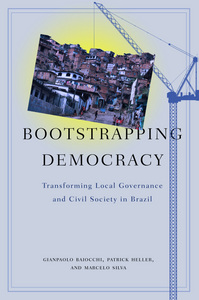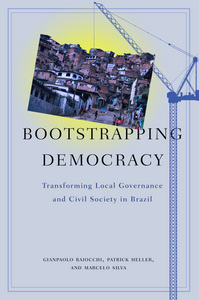Comparing eight municipios, or towns, in Brazil, Bootstrapping Democracy investigates whether participatory budgeting (PB) reforms make a difference in deepening democracy and empowering civil society. While the authors acknowledge the need for an initial “blueprint” of the best way to institutionalize PB, they emphasize the importance of the “bootstrap” – the local-level innovations that adapt PB to the existing social and civil society environment.
Bootstrapping Democracy opens by emphasizing the importance of local government to citizens – not just because it is the primary mechanism providing basic infrastructure, primary health care, education, economic support, and policing – but because “it is in local settings that citizens learn democracy.” (20) Moreover, cooperative engagement between local democracies and civil society actors “strengthen[s] both governance and democracy.” (164)
Such collaborative arrangements are only possible, however, if the democratic institutions themselves encourage citizen access. The authors position PB as one mechanism of doing so — “addressing the deficits of formal democracy and . . . recognizing that there are both normative and functional reasons to link state power to the information, creativity, energy, and capacity for collective action of civil society.” (148) However, in keeping with their emphasis on “bootstrapping,” the authors write that, “the conditions for successful participation are not rigidly determined. When offered genuine opportunities for participation, local actors will get involved.” (161)
Once genuinely participatory institutions are established, Bootstrapping Democracy found that local actors – including the poor and most marginalized – will take advantage of them and that, “even citizens with little more capacity than their own commitment to democratic engagement can effectively participate in local government.” (162) While the authors do not discuss the gender implications of PB in Brazil, they do draw an analogy to the campaign for decentralized planning in Keralta, India and its success increasing women’s relative participation in local level governance. (160)
The authors demonstrate that PB in Brazil “was positively associated with increased municipal spending in health, with improved fiscal standing of municipalities, improvement of service provision in some areas like access to drinking water, and improvement in some human development outcomes such as poverty and enrollment rates.” (72) But the broader lesson of the book for those interested in participatory democracy – and development generally – is that properly designed participatory institutions expand the citizenry by including traditionally marginalized groups, expand the range of issues that are subject to democratic processes by taking on the local issues that citizens care most about, and achieve “measurable improvements in the quality and inclusiveness of governance.” (72 and 114-5)
Bootstrapping Democracy
Transforming Local Governance and Civil Society in Brazil
Gianpaolo Baiocchi, Patrick Heller, and Marcelo K. Silva



Leave a Reply
You must be logged in to post a comment.